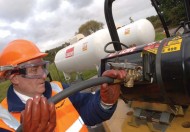 As part of its title sponsorship of the 2009 FLTA safety conference, LPG supplier Calor will deliver a keynote presentation on safety considerations when using LPG.
As part of its title sponsorship of the 2009 FLTA safety conference, LPG supplier Calor will deliver a keynote presentation on safety considerations when using LPG.
Calor’s training coordinator Phil Anderson will provide delegates with information on the safe storage of LPG, whether it be cylinder supply, bulk tanks or fixed fuel tanks; how to identify and minimize hazards; the importance of safe refueling and the importance of keeping up to date with health and safety matters.
Phil says: ”Health and safety is one of the most important areas of materials handling and managers have a duty to ensure that their operators are fully trained.
“Whilst LPG can provide a safe, efficient and reliable fuel to power forklift trucks, it is important to be aware of potential hazards and this conference is an ideal platform to remind operators of the importance of good practice when operating and refuelling forklifts”.
As the UK’s leading supplier of LPG, Calor is well established in the industry, with all the major manufacturers offering LPG powered vehicles in their product ranges.
Bulk marketing manager, Laura Luty, says health and safety is top of the agenda at Calor, which is why the company has committed to supporting this year’s conference.
She says: “Customers choosing Calor can rest assured that Health and Safety is of utmost importance to us. We are committed to ensuring both new and existing customers are trained to the highest possible levels and aim to work in partnership with them to ensure safe refuelling procedures are followed every time.”
Calor offers two forklift truck training courses for its customers operating LPG powered vehicles: Safe Refuelling Instruction for operatives and Train the Trainer for instructors. Both courses aim to instruct forklift truck operators how to refuel equipment correctly and safely when using Calor LPG.
LPG is well established in the industry, with all the major manufacturers offering the fuel in their product ranges.
Calor’s Bulk Market Manager, Laura Luty, says: ”Recent years have seen relentless advance of the cleaner burning fuel by its acknowledged advantages compared to both diesel and electricity.
Benefits over diesel are principally based on reduced emissions, which, when a three-way catalytic converter is fitted, allows fork lift trucks to operate in more sensitive areas, an important consideration when transporting consumable goods.
LPG continues to be acknowledged as an environmentally friendly and versatile fuel alternative without compromising performance achieving a 95 per cent reduction in NOx emissions compared to diesel. As a high octane, cleaner burning fuel, LPG’s use also results in less carbon build up on engines, less oil contamination and less overall engine wear.
In contrast to electric fork lift trucks, which typically take around eight hours to recharge, LPG trucks can be quickly refuelled from a bulk tank, or by changing a gas cylinder, allowing a true 24/7 operation. As well as saving time on refuelling, running a fleet on LPG can save valuable storage space with no need for a separate area devoted to battery charging.
LPG stands out on its own, with a number of inherent advantages, and LPG trucks provide true flexibility, being suitable for both indoor and outdoor use. Fuel storage and supply decisions are tailored for the customer to find the best business solution whether its bulk tanks or cylinders and with a recognised supplier such as Calor, the process is painless.
Servicing and maintenance of LPG bulk tanks remains the responsibility of the fuel supplier and Calor performs a detailed tank inspection at every fuel delivery. Calor operates the UK’s largest LPG delivery network and Calor’s The Think Tank® telemetry system automatically monitors the level of LPG within the tank to ensure that a customer should never run out of LPG.
A key aim for Calor is to position itself as the fuel provider of choice in the materials handling sector. “It goes far beyond merely the supply of gas or the fuel price,” adds Laura. “Discussions with an LPG expert with the right technical capability can ensure a hassle free conversion to LPG as well as providing a package of ongoing technical support, safety assurance and training.
“It’s small wonder that the march of LPG in the fork lift truck market is set to continue,“ concludes Laura.
For more information on Calor, its training packages, or the benefits of LPG, log on to www.lpg-forklift.co.uk, email askcalor@calor.co.uk or call 0800 216 659.




Comments are closed.